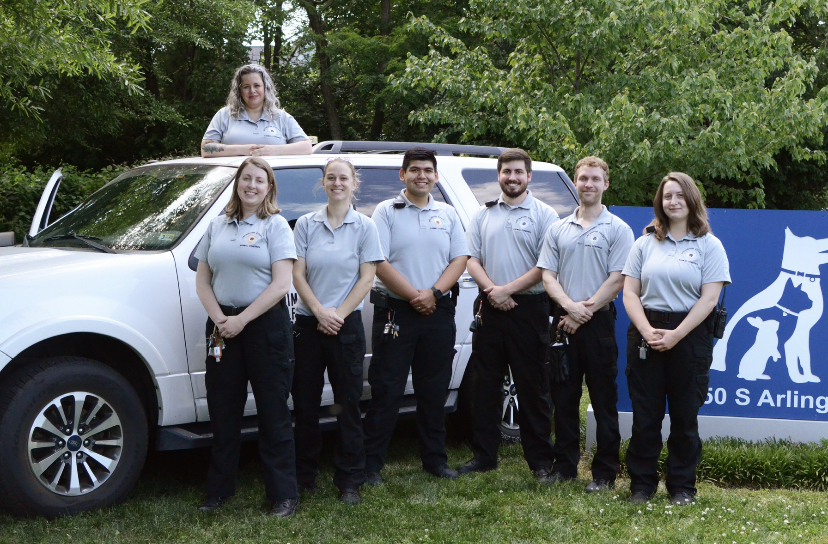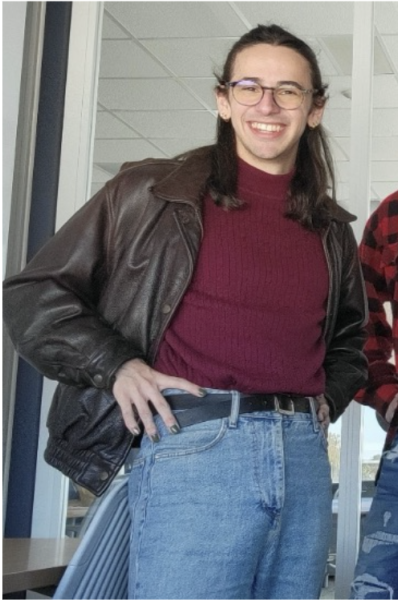Behind the Movies: What is Animal Control Really?
Animal Control Officers Discuss the Role of the Media in Their Life
Photo via Animal Welfare League of Arlington
The Animal Control Officers of the Animal Welfare League of Arlington (AWLA) are pictured in front of their truck.
“Settle down!” a cartoon man in a blue uniform says as he wrestles with a Jack Russell Terrier, Max, the protagonist of the fifth-highest-grossing original worldwide film “Secret Life of Pets.” Looking at Max, the man in the blue uniform, assumed to be an animal control officer (ACO), says “this is it for you.”
“Secret Life of Pets,” “Lady and the Tramp,” and “Curious George” are all movies or TV shows that contain scenes depicting ACOs as bad guys. Many ACOs claim that these negative portrayals are inaccurate and misleading.
“[In the movies he] takes it to the kennel and throws a dog inside and forgets about it,” Sergeant Cliff Ballena, an ACO in Arlington, said. “That’s not the case for us. We put the dog in the kennel [but] we set them up with toys, blankets; they’re not in a dark room by themselves. We care about them.”
Animal control in Arlington is run by the Animal Welfare League of Arlington (AWLA). Animal control “responds to calls from the community regarding pets and wildlife, investigates cases involving animal bites, abuse or neglect, sick or injured animals, and more,” according to the AWLA website.
Animal control does use euthanasia when there are behavior issues, mostly on wildlife. They euthanize about 100 animals in a year, though send around 365 animals for rehabilitation to be released into the wild. There are levels of licenses that citizens can receive to become a rehabber when they have met the requirements of the state.
“I have rehabbed bunnies before, opossums, and turtles. But I stick with squirrels as best as I can. They do require more maintenance, but I just love them. My wall here has a whole bunch of [pictures of] squirrels,” Sergeant Ballena said.

He rehabilitates as a hobby outside of his job as ACO. He takes care of the squirrels for about three months and then releases them into the wild. One example of the work ACOs do is exemplified by Deputy ACO Kelley Davis’ search for an injured owl on the job. She walked through a forest on the side of a bike trail.
“It wasn’t until I placed my neck on top of it and it didn’t even try to fight it that I was like, ‘oh, buddy, you’re not doing good at all,’” Deputy Davis said.
She realized that bees were swarming the owl after seeing that the owl was sitting on a wasps’ nest. While trying to rescue the owl, the wasps stung Deputy Davis over and over.
“They got all my arms and my legs like everywhere,” Deputy Davis said. “By now there was just like a crowd of people staring at me. And I was just being stung by these wasps. And I was like, ‘all right, buddy, we’re in it together’ and I picked [the owl] up. [Then] I had to traverse back across the swamp.”
After rescuing the owl, Deputy Davis had to go to the emergency room as she had over 30 wasps’ stings all over her body. The bees had gotten in her clothes and vest. The owl recovered from its stings and was later released into the wild by Animal Control.
“[The animals I rescue] sit in a seat and I buckle them up like I would a person,” Deputy Davis said. “[There have been times where] I’ve picked up an animal that is very cold in summertime and I know they’re not feeling good. I’ve definitely been in my truck with it being like 80 degrees out and the heat pumping and I’m sweating but I know this animal needs to [get warm] quickly.”
In addition to helping injured wildlife, ACOs have a number of other roles. If a dog is off leash, the ACO can give out tickets to their owner. And when there is a call about an abandoned animal, the ACOs act.
“We always post a notice and put up tape on the doors,” Deputy Davis said. “After 24 hours, if the tape is still there, we can confidently say that nobody has been inside that house for at least 24 hours and then we can easily get a search warrant. Then police would enter the house and then we would take the dog [or other animal] and make sure it’s getting cared for while we attempt to locate an owner.”
In some jurisdictions, ACOs are police officers. Even though they are not sworn in as police officers in Arlington, they work closely with police officers. When a person dies in their home, ACOs collect the pets that have outlived their owners and are the first ones in the house. ACOs are also often called up as witnesses to go to court for animal cruelty.
“My last case was for a summons that I wrote for minimum requirements where this woman had her guinea pigs outside in the rain,” Sergeant Ballena said. “That’s something you just think is common sense.”
Estee Levine-Little, an Arlington resident for 20 years, has experience with animal control. Her husband almost stepped on a bird and it did not fly away, which convinced her that the bird needed assistance. She then called animal control, using the police non-emergency phone number, and an animal control officer arrived on the scene.
“[The ACO] was like, ‘oh, something’s wrong with a bird’ and he tried to grab it,” Levine-Little said. “It did fly away but it was flying all over the place… it was like a drunk.”
The ACO was able to grab the bird off the tree because it was on a low branch. Levine-Little asked what was wrong and was told it was an eye infection and that a rehabber would treat it with antibiotics and release the bird back into the wild.
“It’s something that [the ACO] had previously seen around the neighborhood,” Levine-Little said. “The reason they get these eye infections is that people put out bird feed in the feeders but they don’t clean the bird feed[er].”
After learning this information, Levine-Little began to tell her neighbors to clean their bird feeders. A couple of months later, an article in the Washington Post came out confirming that bird feeders need to be cleaned. Arlington provides ACOs with other resources that they can use to help animals, which they take advantage of.
“We have vouchers so if someone’s pet isn’t spayed or neutered, we can give them a free voucher for them to be able to get their cat or dog spayed or neutered,” Deputy Davis said. “We do clinics for microchip and rabies vaccinations through the shelter. We have a pet pantry for people who fall on hard times. If they can’t get dog food or cat food because they don’t have means to get to the shelter, we take our trucks and we deliver them cat food or dog food.”
ACOs help animals of all kinds in Arlington, from wildlife to abandoned pets. And while ACOs know all the good they are doing, it is important to them that they are viewed positively by those in the community they are helping.
“When people make negative comments [or have negative opinions of us], whether we’re driving by and they shoot some [words at us as we drive], it does happen because they just assume that we’re in the area to take people’s animals away,” Deputy Davis said. “It can affect somebody especially if they’re having a hard day and then called a dog catcher like you’re just gonna euthanize animals when it’s not the case at all.”
For more information on animal control officers and how to help the shelter go to: https://awla.org/











